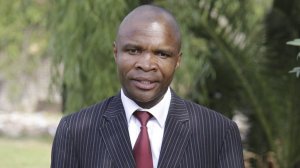The Third Party Introduction to Transnet Freight Railways Should not Translate to Privatize Keynesianism
This article has been supplied.
By Bongani Mankewu – Director of the Infrastructure Finance Advisory Institute
Blurb: The Meiji Restoration of 1868 in Japan, which began massive industrialization under the motto fukoku kyōhei ("enrich the country, strengthen the military"), is indispensable for South Africa.
As a means of understanding Public Private Partnership (PPP) legislative concerns, Krumm (2016) introduces the concept of privatized Keynesianism, first proposed by Crouch (2009). Privatized Keynesianism was designed to ease the government off of its overall economic commitments. In South Africa, our faith seems to be in the recently formed National Energy Crisis Committee (NECOM) and the National Logistics Crisis Committee (NLCC), both of which are dominated by special interests.
South Africa's persistently anemic economic situation can be revived through PPPs, even though they aren't the panacea. It is vital that public sector representatives have the expertise and experience to negotiate with astute profit-driven private parties.
Keynesianism, like PPPs, often has its roots in private enterprises before becoming privatized and evolving into a common good. Due to Agency Theory's emphasis on and prescription of the common good, citizens are required to cover the costly debt. Just as South Africans are still repaying debt from Transnet's recent rolling stock of 1064 locomotives, the nation is also saddled with debt from Eskom's construction of power plants, amounting to over R400 billion. There is a social and economic collapse in the country due to a lack of electricity, while Transnet lacks efficient trains and railway lines to transport export products to the arteries of global trade.
One crucial aspect of conflict of interest that the public sector needs to comprehend is how it leads to banks' reckless behavior. Transaction cost and expediency play a significant role in their decision-making, causing them to ignore the checks and accounting procedures they should adhere to. However, this interest-driven financial strategy is particularly disguised in PPPs because the ventures and the future reimbursement obligations are not detectable in public records.
The key objective of privatized Keynesianism is to have governments pull out of general obligations regarding the economy. Public actors need to understand that multilateral finance institutions avert bankruptcy when they extend credit to borrowers. Their view would be that contracts are sacred and should not be violated.
PPP obligations are not recorded in public records, which could lead to private participants disregarding them completely, which would violate the social contract, an even more significant contract. Multilateral financing institutions provided funds to governments in order to bail out foreign creditors who hadn't performed due diligence when lending. In the end, we are left with austerity budgets without any clear explanations.
Praise be to the private sector for assuming responsibility for assets intended for the common good of society as a whole, we must also be mindful that privatized Keynesianism is necessary to sustain financialization—the financial actors' control over the economy. The "Privatized Keynesianism" of contemporary economies links the roles of less developed countries as exporters and recipients of foreign investment.
Similar to privatized Keynesianism, enormous amounts of entirely imaginary goods are created, and these goods' nominal values are used to leverage even more of the bad debts that fund the bad debts. In a similar vein, PPP finance of infrastructure prioritizes political expediency over commercial viability. This is the current state of affairs at Transnet: an R130 billion debt that needs to be repaid through bad debt or limitations on the company's ability to borrow money to finance its operations.
The PPP and/or concessions are ideal models for our economic conditions but should we have public representatives who blink indefinitely in those negotiations, industrialization, and social revival from the ongoing economic turmoil will remain as elusive as the proverbial holy grail.
The Meiji Restoration of 1868 in Japan, which began massive industrialization under the motto fukoku kyōhei ("enrich the country, strengthen the military"), is indispensable for South Africa.
Itō Hirobumi wrote to fellow Meiji leader Kido Koin, “If we cannot rule at home, we will be unable to set matters to right abroad”. Sovereign hegemony of government should not be subcontracted to the private sector in a constitutional democracy.
Article Enquiry
Email Article
Save Article
Feedback
To advertise email advertising@creamermedia.co.za or click here
Comments
Announcements
What's On
Subscribe to improve your user experience...
Option 1 (equivalent of R125 a month):
Receive a weekly copy of Creamer Media's Engineering News & Mining Weekly magazine
(print copy for those in South Africa and e-magazine for those outside of South Africa)
Receive daily email newsletters
Access to full search results
Access archive of magazine back copies
Access to Projects in Progress
Access to ONE Research Report of your choice in PDF format
Option 2 (equivalent of R375 a month):
All benefits from Option 1
PLUS
Access to Creamer Media's Research Channel Africa for ALL Research Reports, in PDF format, on various industrial and mining sectors
including Electricity; Water; Energy Transition; Hydrogen; Roads, Rail and Ports; Coal; Gold; Platinum; Battery Metals; etc.
Already a subscriber?
Forgotten your password?
Receive weekly copy of Creamer Media's Engineering News & Mining Weekly magazine (print copy for those in South Africa and e-magazine for those outside of South Africa)
➕
Recieve daily email newsletters
➕
Access to full search results
➕
Access archive of magazine back copies
➕
Access to Projects in Progress
➕
Access to ONE Research Report of your choice in PDF format
RESEARCH CHANNEL AFRICA
R4500 (equivalent of R375 a month)
SUBSCRIBEAll benefits from Option 1
➕
Access to Creamer Media's Research Channel Africa for ALL Research Reports on various industrial and mining sectors, in PDF format, including on:
Electricity
➕
Water
➕
Energy Transition
➕
Hydrogen
➕
Roads, Rail and Ports
➕
Coal
➕
Gold
➕
Platinum
➕
Battery Metals
➕
etc.
Receive all benefits from Option 1 or Option 2 delivered to numerous people at your company
➕
Multiple User names and Passwords for simultaneous log-ins
➕
Intranet integration access to all in your organisation




















